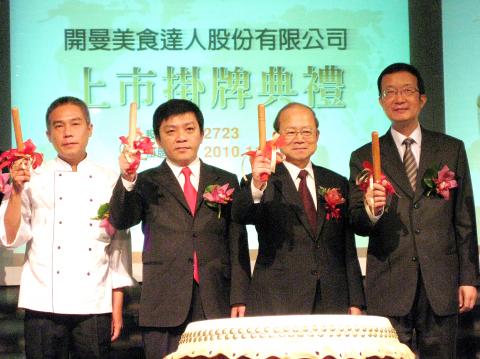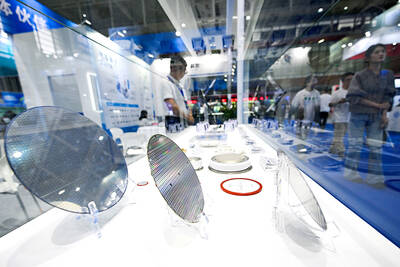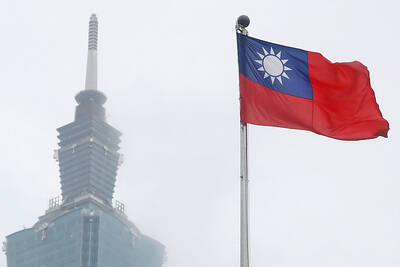“After a six-year learning curve, I assume we have now graduated from elementary school with flying colors,” Gourmet Master Co (美食達人) chief operating officer Chris Lin (林明哲) said at a press briefing on Nov. 18, detailing the company’s plan for its initial public offering.
Lin was referring to 85°C (85度C), a bakery and cafe chain established in 2004 by Gourmet Master with its first store in Yonghe (永和), Taipei County.
It has now grown into an international food and beverage empire with more than 400 stores in Taiwan, China, the US and Australia, employing more than 10,200 people.

PHOTO: CNA
The success story of the chain’s founder, Wu Cheng-hsueh (吳政學), is widely renowned in Taiwan’s food and beverage sector.
Wu, 44, was born into a poor family in Yunlin County. A junior high school dropout, he started his working career earlier than most of his peers.
His first job was as a production operator at a tennis racket factory. After saving more than NT$100,000 (US$3,230) by working 16-hour shifts at the factory, he opened a hair salon with a friend.
He later set up a shoe sole processing factory, which employed more than 1,000 people at its peak. However, Wu decided to close the business after it became plagued by bad debt.
He then took a job as a marble paving contractor, working on construction projects.
Other “not-so--successful” items on Wu’s resume include a franchise of the Easy Way International Co (休閒小站) drink chain, as well as the Hot to Home (熱到家) chain, which sold small pizzas for NT$50 apiece. The pizza chain, launched to much fanfare, closed after nine months of operation.
“Business ventures are the only way for me to say goodbye to economic constraints,” Wu said in a magazine interview.
“I don’t hesitate too much nor am I indecisive when venturing into business. Perhaps this is because I didn’t study too much and learn all those business management theories. When I make a decision, I execute it fast and furious,” he said.
Venturing into 85oC (which is named for the ideal temperature at which to brew coffee) was a career breakthrough for Wu, who wondered why lunch boxes could sell for as little as NT$50, but a cup of coffee at popular cafe chains sold for double that price.
Wu first built the business by sourcing good coffee beans. In 2004, he went to the source of Starbucks’ most popular roast and persuaded the Guatemalan supplier to sell him virtually all its arabica coffee beans.
He proceeded by hiring five-star hotel chefs to concoct fancy drinks and desserts that sell for about half the price of those at Starbucks’.
One of those chefs was Henry Cheng (鄭吉隆), assistant general manager of Gourmet Master’s Chinese operations. He was poached from Grand Hyatt Taipei (台北君悅).
Wu’s eagerness for success meant frequent late night telephone calls to Cheng, who told the Taipei Times that the discussions sometimes dragged into the early hours of the morning.
Separately, both would light a cigarette as they talked on their cellphones to work out “recipes for success” that included menus, how to make new confectioneries and tailor outlet furnishings.
In September 2006, Gourmet Master developed a technology to make frozen dough, therefore making it possible to standardize the whole baking operation. Its central kitchens would send the frozen dough — along with other ingredients and partially prepared confectioneries — to the outlets.
From there, chefs would bake the products on the spot, serving customers fresh-from-the-oven breads to take away.
Wu also decided to bring in a number of professionals to tap into their international management experience.
Gourmet Master’s head of personnel, Deng Jen-rong (鄧仁榮), previously worked at food and beverage conglomerate Ting Hsin International Group (頂新集團); vice financial president Michelle Hsieh (謝明惠) came from accountancy firm Deloitte; chief operating officer Lin was previously the president of Taiwan FamilyMart Co (全家便利商店); while management division head David Chiu (邱志宏) worked for Asustek Computer Inc (華碩) and Micro-Star International Co (微星科技).
At the Nov. 18 press conference, these executives lined up to discuss the company’s plans for future expansion via its public offering in Taiwan.
“We are a bunch of ordinary folks, but we have extraordinary dreams,” Hsieh said.
The extraordinary dreams includ Gourmet Master’s goal of opening a total of 1,000 outlets in China and 20 outlets in the US by 2016.
There will be 100 more stores established in China next year, adding to the 170 outlets that the firm hopes to have open in China by the end of this year.
In the US, Gourmet Master has one store in Irvine, California, which was opened in September last year. The Irvine store raked in average monthly sales of US$750,000 — seven times higher than the average sales of all its other stores in Taiwan, China and Australia.
“The performance at the US store is a miracle,” Wu said, citing its customer base, which is now comprised of 50 percent Westerners compared with only 10 percent when the store first opened its doors.
“This means our bakery and confectioneries have been accepted by the West,” Wu said.
Meanwhile, Wu conceded that the performance of its four branches in Australia have lagged behind those in the US and China, and the company will steer its focus to those markets for now.
85oC, dubbed “Taiwanese Starbucks” by the local media, has even caught the attention of foreign media.
Time magazine carried an article in January last year that featured 85oC’s sea salt coffee, which has sea salt whipped together with creamy foam on top of sweetened coffee.
With big expansion plans on the cards, whether Gourmet Master will be able to sustain its success remains to be seen.
“I hope that in six year’s time, when we graduate from high school, we will show you an even more impressive transcript,” Lin said.

NEW IMPORTS: Car dealer PG Union Corp said it would consider introducing US-made models such as the Jeep Grand Cherokee and Stellantis’ RAM 1500 to Taiwan Tesla Taiwan yesterday said that it does not plan to cut its car prices in the wake of Washington and Taipei signing the Agreement on Reciprocal Trade on Thursday to eliminate tariffs on US-made cars. On the other hand, Mercedes-Benz Taiwan said it is planning to lower the price of its five models imported from the US after the zero tariff comes into effect. Tesla in a statement said it has no plan to adjust the prices of the US-made Model 3, Model S and Model X as tariffs are not the only factor the automaker uses to determine pricing policies. Tesla said

OpenAI has warned US lawmakers that its Chinese rival DeepSeek (深度求索) is using unfair and increasingly sophisticated methods to extract results from leading US artificial intelligence (AI) models to train the next generation of its breakthrough R1 chatbot, a memo reviewed by Bloomberg News showed. In the memo, sent on Thursday to the US House of Representatives Select Committee on China, OpenAI said that DeepSeek had used so-called distillation techniques as part of “ongoing efforts to free-ride on the capabilities developed by OpenAI and other US frontier labs.” The company said it had detected “new, obfuscated methods” designed to evade OpenAI’s defenses

China’s top chipmaker has warned that breakaway spending on artificial intelligence (AI) chips is bringing forward years of future demand, raising the risk that some data centers could sit idle. “Companies would love to build 10 years’ worth of data center capacity within one or two years,” Semiconductor Manufacturing International Corp (SMIC, 中芯) cochief executive officer Zhao Haijun (趙海軍) said yesterday on a call with analysts. “As for what exactly these data centers will do, that hasn’t been fully thought through.” Moody’s Ratings projects that AI-related infrastructure investment would exceed US$3 trillion over the next five years, as developers pour eye-watering sums

Bank of America Corp nearly doubled its forecast for the nation’s economic growth this year, adding to a slew of upgrades even after a rip-roaring last year propelled by demand for artificial intelligence (AI). The firm lifted its projection to 8 percent from 4.5 percent on “relentless global demand” for the hardware that Taiwanese companies make, according to a note dated yesterday by analysts including Xiaoqing Pi (皮曉青). Taiwan’s GDP expanded 8.63 percent last year, the fastest pace since 2010. The increase “reflects our sustained optimism over Taiwan’s technology driven expansion and is reinforced by several recent developments,” including a more stable currency,